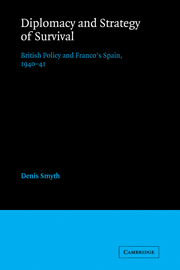Book contents
- Frontmatter
- Contents
- Preface
- Introduction
- 1 Britain and and the birth of Franco's Spain, 1936–39
- 2 Defining a policy
- 3 Opposition
- 4 The Spanish scene
- 5 Strategic diplomacy: September–October, 1940
- 6 Economic diplomacy: September–December, 1940
- 7 The Tangier crisis
- 8 The limits of attraction
- 9 The exhaustion of diplomacy
- Conclusion
- Notes
- Bibliography
- Index
6 - Economic diplomacy: September–December, 1940
Published online by Cambridge University Press: 05 November 2011
- Frontmatter
- Contents
- Preface
- Introduction
- 1 Britain and and the birth of Franco's Spain, 1936–39
- 2 Defining a policy
- 3 Opposition
- 4 The Spanish scene
- 5 Strategic diplomacy: September–October, 1940
- 6 Economic diplomacy: September–December, 1940
- 7 The Tangier crisis
- 8 The limits of attraction
- 9 The exhaustion of diplomacy
- Conclusion
- Notes
- Bibliography
- Index
Summary
The German newspaper, Deutsche Allegemeine Zeitung, had greeted Serrano Suñer's appointment as Spanish Minister for Foreign Affairs with special satisfaction, since Franco, it argued, was elevating his ‘chief adviser’ at precisely ‘the moment when foreign policy becomes more important for Spain than home policy’. Nevertheless, a striking change in the editorial line of Spain's officially-controlled newspapers, coinciding with Serrano's appointment, seemed to belie the D.A.Z.'s confident assertion of the primacy of foreign over domestic policy for Spain. Thus Arriba, the hardline Falange newspaper which, hitherto, had tried to make ideological capital out of Spain's desperate economic plight by emphasising the need for sacrifice for the common good and coining such paradoxical slogans as ‘noble scarcity’, and ‘spain's famine is her proud own’, abruptly altered its course. Commenting on the first official speech of the new Minister of Industry and Commerce, Demetrio Carceller, (appointed the same day as Serrano Suñer), it declared that he had ‘outlined very clearly the basis which sustained modern states. Just as revolution without bread and justice would be a swindle, so states do not maintain themselves, nor are their regimes effective, if they do not control the economy.’ ‘Revolution of Bread and Justice’ was the slogan of the hour, Spain's internal crisis the pressing priority. Another Spanish paper, Pueblo, exclaimed that ‘we shall never succeed in obtaining the national amity we need for our purposes while hunger is the people's chief counsellor’.
- Type
- Chapter
- Information
- Diplomacy and Strategy of SurvivalBritish Policy and Franco's Spain, 1940-41, pp. 110 - 132Publisher: Cambridge University PressPrint publication year: 1986

